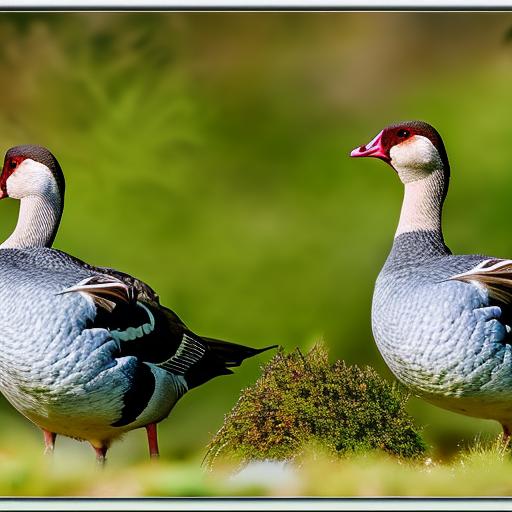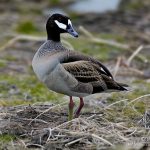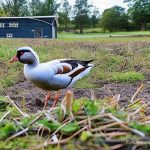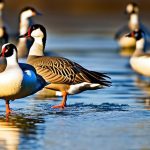Keeping geese in your garden can provide a multitude of benefits for both you and your property. Geese are excellent natural pest control, as they will eat a variety of insects, snails, and other pests that can damage your garden. Their presence can help to keep your garden free from unwanted pests without the need for harmful chemicals. Additionally, geese are great at keeping the grass trimmed and can help to maintain a tidy and well-kept garden space. Their grazing habits can also help to fertilize the soil, leading to healthier and more vibrant plant growth.
Geese are also known for their protective nature, making them excellent watchdogs for your property. Their honking and alertness can deter potential intruders, providing an added layer of security for your home and garden. Furthermore, geese can be wonderful additions to a family or community garden, as they can provide a source of entertainment and joy for both children and adults. Their playful and social nature can bring a sense of liveliness to your garden space, creating a more dynamic and enjoyable environment for all who visit.
Key Takeaways
- Geese can help control pests and weeds in your garden, reducing the need for chemical pesticides.
- Consider the space and resources needed to properly care for geese before bringing them into your garden.
- Create a safe and comfortable environment for geese with access to water, shelter, and grazing areas.
- Provide a balanced diet for geese, including grass, grains, and access to clean water, and monitor their health and well-being regularly.
- Potential challenges of keeping geese in your garden include noise, mess, and potential conflicts with neighbors or local regulations. Consider alternatives such as ducks or chickens if geese are not suitable for your garden.
Considerations Before Keeping Geese in Your Garden
Before deciding to keep geese in your garden, there are several important considerations to take into account. Firstly, it’s essential to consider the amount of space you have available for the geese to roam and graze. Geese require a significant amount of space to move around and forage, so it’s important to ensure that your garden can accommodate their needs. Additionally, it’s crucial to consider the potential noise and mess that geese can create. Their honking can be quite loud, which may not be suitable for all environments. Furthermore, geese produce a significant amount of droppings, which can impact the cleanliness of your garden space.
Another important consideration is the temperament of geese. While they can be friendly and social animals, they can also be territorial and aggressive, especially during breeding season. It’s important to understand the behavior of geese and how to properly handle and care for them to ensure a safe and harmonious environment for both the geese and yourself. Additionally, it’s important to consider the potential impact of geese on other wildlife in your garden, as they may compete with other animals for food and resources.
Creating a Suitable Environment for Geese in Your Garden
Creating a suitable environment for geese in your garden is essential to ensure their health and well-being. Firstly, it’s important to provide ample space for the geese to roam and graze. A fenced-in area can help to keep the geese contained while still allowing them to move freely. Additionally, it’s important to provide access to fresh water for drinking and bathing, as well as shelter from the elements. A small pond or kiddie pool can provide a suitable water source for the geese to enjoy.
Furthermore, it’s important to consider the landscaping of your garden to ensure that it is safe and suitable for geese. Avoid using toxic plants or chemicals in your garden that could be harmful to the geese. Instead, focus on creating a natural and diverse environment with plenty of grasses, shrubs, and other vegetation for the geese to graze on. Providing hiding spots and nesting areas can also help to create a more natural and comfortable environment for the geese.
Feeding and Caring for Geese in Your Garden
Feeding and caring for geese in your garden requires careful attention to their dietary needs and overall well-being. Geese are primarily herbivores and require a diet rich in grasses, grains, and leafy greens. It’s important to provide access to fresh grass and vegetation for the geese to graze on, as well as supplemental feed such as cracked corn or poultry pellets. Additionally, it’s important to ensure that the geese have access to clean water at all times for drinking and bathing.
Regular grooming and health checks are also essential for caring for geese in your garden. This includes trimming their wings and nails as needed, as well as monitoring their overall health and behavior. It’s important to be aware of any signs of illness or distress in the geese and seek veterinary care if necessary. Additionally, providing enrichment activities such as toys or treats can help to keep the geese stimulated and happy in their garden environment.
Potential Challenges of Keeping Geese in Your Garden
While keeping geese in your garden can provide numerous benefits, there are also potential challenges that may arise. One common challenge is managing the noise level of the geese, as their honking can be quite loud and disruptive, especially during breeding season. Additionally, managing the mess created by goose droppings can be a challenge, requiring regular cleaning and maintenance of the garden space.
Another potential challenge is managing the territorial and aggressive behavior of geese, especially during breeding season. It’s important to understand their behavior and take precautions to ensure the safety of both the geese and yourself. Additionally, geese may compete with other wildlife in your garden for food and resources, which can impact the overall balance of your garden ecosystem.
Legal and Zoning Considerations for Keeping Geese in Your Garden
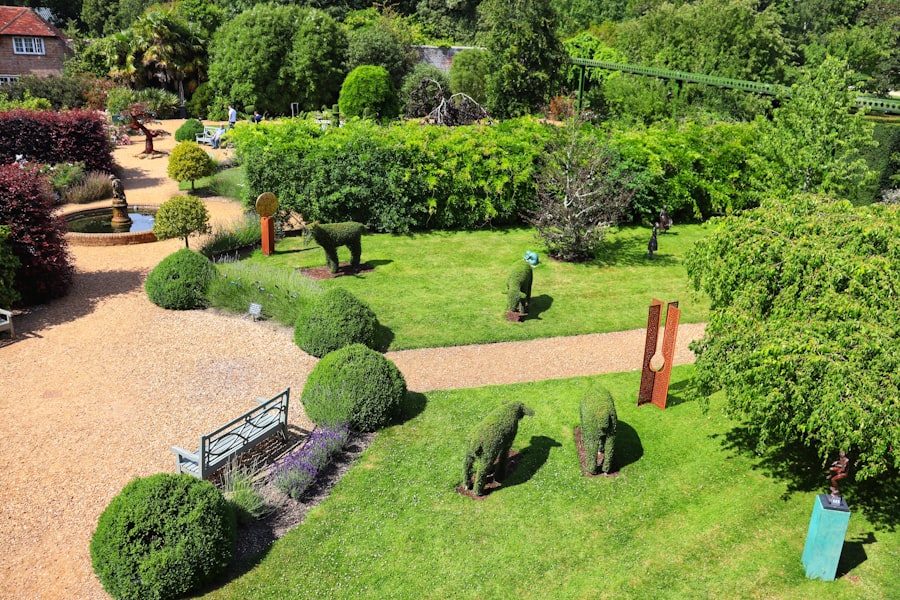
Before keeping geese in your garden, it’s important to consider any legal or zoning regulations that may apply to keeping livestock on your property. Some areas may have restrictions on keeping geese or other poultry animals within city limits or residential areas. It’s important to research local ordinances and regulations regarding keeping geese in your area to ensure that you are in compliance with any applicable laws.
Additionally, it’s important to consider any potential neighbor concerns or objections to keeping geese in your garden. Open communication with neighbors about your plans to keep geese can help to address any potential issues or concerns before they arise. Being a responsible and considerate neighbor can help to create a harmonious environment for both you and your community.
Alternatives to Keeping Geese in Your Garden
If keeping geese in your garden is not feasible or desirable, there are several alternative options to consider. One alternative is to create a welcoming habitat for wild geese in your area by providing access to water sources, natural vegetation, and shelter. This can help to support local wildlife populations while still enjoying the presence of geese in your environment.
Another alternative is to volunteer or support local wildlife rehabilitation centers or sanctuaries that care for geese and other wildlife in need. This can provide an opportunity to interact with geese and contribute to their well-being without the responsibility of keeping them on your property.
In conclusion, keeping geese in your garden can provide numerous benefits such as natural pest control, entertainment, and security. However, it’s important to carefully consider the space, environment, care requirements, potential challenges, legal considerations, and alternative options before making the decision to keep geese in your garden. With proper planning and consideration, keeping geese in your garden can be a rewarding experience for both you and the geese themselves.
If you’re considering keeping geese in your garden, you may also be interested in learning about the best flooring options for a chicken coop. The floor of a chicken coop plays a crucial role in maintaining the health and well-being of your poultry. To find out more about this topic, check out this informative article on choosing the right flooring for your chicken coop. Understanding the importance of proper flooring can help you create a comfortable and safe environment for all your feathered friends.
FAQs
Can I keep geese in my garden?
Yes, you can keep geese in your garden if you have enough space and the proper facilities to care for them.
What do geese need in a garden?
Geese need access to a pond or water source, shelter, and a secure fenced area to roam and graze.
Are geese good for pest control in the garden?
Yes, geese can help control pests in the garden by eating insects and weeds.
What should I consider before keeping geese in my garden?
Consider the space and facilities needed for geese, local regulations, and the time and effort required to care for them.
Do geese require special care in the garden?
Geese require regular access to water for bathing and drinking, as well as proper nutrition and protection from predators.
Can geese be aggressive in a garden setting?
Geese can be territorial and may become aggressive, especially during breeding season. It’s important to understand their behavior and handle them with care.
Meet Walter, the feathered-friend fanatic of Florida! Nestled in the sunshine state, Walter struts through life with his feathered companions, clucking his way to happiness. With a coop that’s fancier than a five-star hotel, he’s the Don Juan of the chicken world. When he’s not teaching his hens to do the cha-cha, you’ll find him in a heated debate with his prized rooster, Sir Clucks-a-Lot. Walter’s poultry passion is no yolk; he’s the sunny-side-up guy you never knew you needed in your flock of friends!

